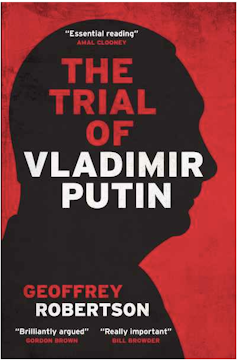Geoffrey Robertson rehearses the scenarios
- Written by Rowan Nicholson, Senior Lecturer in Law, Flinders University

Is Russian president Vladimir Putin guilty of the crime of aggression[1]? In The Trial of Vladimir Putin[2], barrister Geoffrey Robertson answers that question by dramatising what might happen within the walls of a future courtroom.
The question of whether Putin is guilty of aggression is fairly straightforward. Robertson’s book discusses that issue in detail but does not grapple seriously enough with harder questions, such as whether it would be wise to try Putin in his absence – while he remains at liberty in Moscow – instead of physically in the dock.
Review: The Trial of Vladimir Putin – Geoffrey Roberston (New South)
To simplify the law only slightly: a leader who orders an invasion of another country is generally guilty of aggression except where the act is in self-defence or authorised by the United Nations Security Council.
In 2022, Putin ordered an invasion of Ukraine. Russia claimed this was self-defence, but its arguments are made of cardboard, props from a pantomime staged for its allies and domestic audience. You only have to breathe on them to knock them over.
Robertson generally does a sound job of this, though he overlooks the most elaborately constructed of Russia’s cardboard arguments: the fiction that two parts of eastern Ukraine, Donetsk and Luhansk, were independent countries that Russia intervened to assist.
He also tackles the separate question of whether Putin is guilty of war crimes. These are crimes committed during a war, as distinct from the crime of unlawfully starting one. A challenging issue here is that Putin himself is not on the ground in Ukraine. Evidence would be needed that he is responsible in his role as a commander for actions carried out by subordinates.
One of the stronger elements of the book is Robertson’s explanation of where Putin might be tried. The International Criminal Court has jurisdiction to try him for war crimes, and in 2023 it issued a warrant for his arrest[3] for the war crime of transferring Ukrainian children to Russia.
Can it also try him for aggression? In effect it cannot, for reasons that ultimately reflect the reluctance of countries to expose their leaders to prosecution. Instead, a special aggression tribunal would have to be established in the tradition of the trials of Nazis at Nuremberg[4].
Robertson takes his readers through each step of the process: the construction of a tribunal, the case against Putin, the case in his defence, a separate trial for war crimes, and the aftermath – including whether Putin should be executed, which is unlikely but which Robertson controversially argues “must be seriously considered”.
















